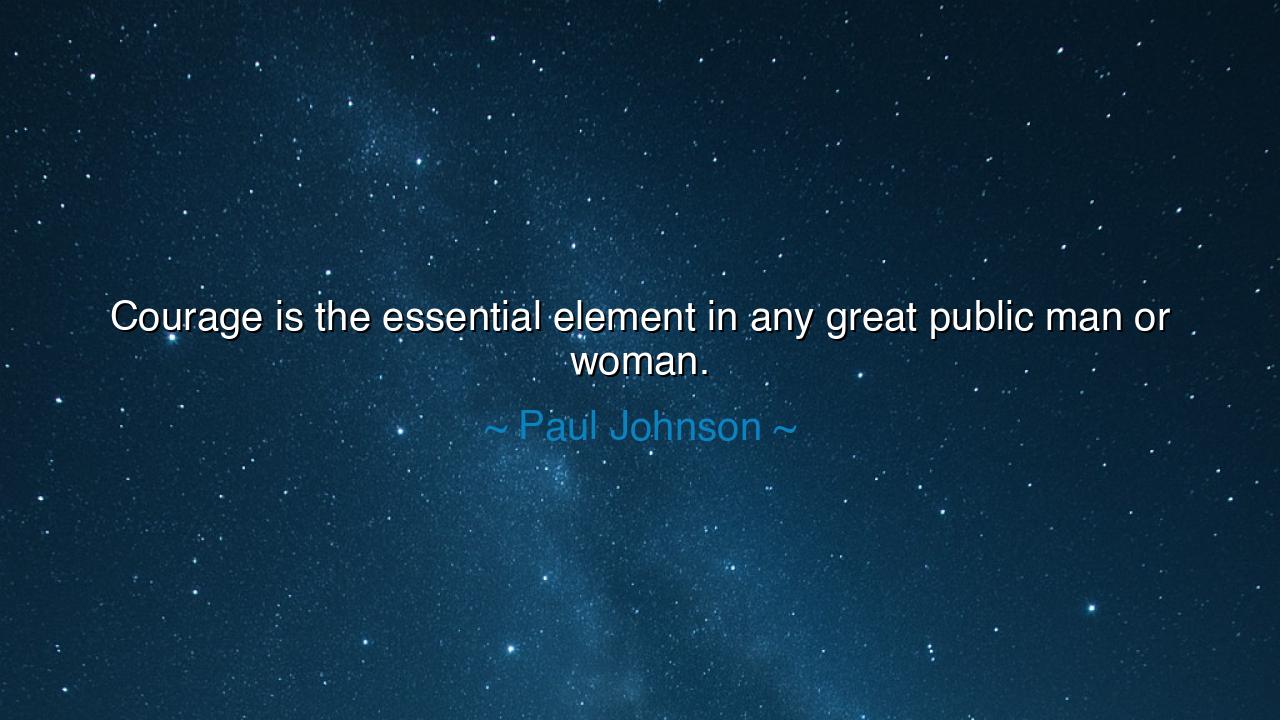
Courage is the essential element in any great public man or






“Courage is the essential element in any great public man or woman.” — so spoke Paul Johnson, the historian whose gaze pierced through centuries of human endeavor to discern what made certain souls rise above the ordinary. In this simple utterance lies a truth as old as civilization itself: that the destiny of nations and the integrity of leaders are forged not by intellect alone, nor by cunning or charm, but by the steady flame of courage. For courage is not mere boldness; it is the quiet defiance of fear in the service of what is right, the steadfastness of heart when all the world trembles.
From the earliest days, the ancients knew that the soul of a leader was tested not in comfort but in crisis. When storms broke upon their people, it was the courageous who stood unmoved. Consider Pericles of Athens, who, amidst plague and war, held firm the ideals of democracy when despair clouded the city’s skies. Or Cincinnatus of Rome, who left his plow to defend his people, then returned humbly to his fields when victory was won. These were not men without fear; rather, they were men who mastered fear, bending it to the will of virtue. They knew that to lead the many, one must first conquer oneself.
Courage, in the truest sense, is not loud nor reckless. It is moral and inward, often unseen by the crowd. When Abraham Lincoln stood before a divided America, he faced not only armies but hatred, misunderstanding, and despair. His was not the courage of the battlefield, but of the heart — the courage to forgive, to persevere, to speak of unity while surrounded by division. It was this quiet fortitude that transformed him from a man of humble birth into a great public man, remembered not for ambition but for moral steadfastness.
There are moments in every age when truth demands a voice, and justice requires a defender. Those who answer that call do so at great cost. Recall Socrates, who refused to renounce his search for truth even before the judges of Athens, drinking the hemlock rather than betray his conscience. His courage did not preserve his life, but it immortalized his soul. So it is that Paul Johnson’s words echo the wisdom of old — that greatness in public life is measured not by power or applause, but by the courage to stand firm in the face of peril.
Yet courage is not the preserve of heroes alone. It belongs, too, to every man and woman who dares to act rightly when it would be easier to remain silent. It is in the teacher who speaks truth to corrupt authority, the journalist who risks exile for honesty, the citizen who defends justice against the mob. The essence of public courage is the willingness to serve something greater than oneself — to place the good of all above the comfort of the individual.
So let this teaching be passed on: that without courage, intellect falters, ambition corrupts, and eloquence becomes empty sound. Courage alone gives form and moral weight to all other virtues. It is the root from which honor grows, the foundation upon which the walls of integrity are built. A coward may be clever, even brilliant, but he will always be a servant to fear; only the courageous can be truly free.
To those who seek greatness — not of fame, but of soul — remember this: cultivate courage not through rash deeds but through steadfast truthfulness. Begin with small acts — speak the truth when it is uncomfortable, defend the absent when they are maligned, stand firm when your conscience whispers against the crowd. Each of these is a stone in the temple of your character. And in time, when the hour of testing comes, you will stand unshaken — for you will have built within yourself that divine strength which Paul Johnson named the essential element in any great public man or woman.






AAdministratorAdministrator
Welcome, honored guests. Please leave a comment, we will respond soon